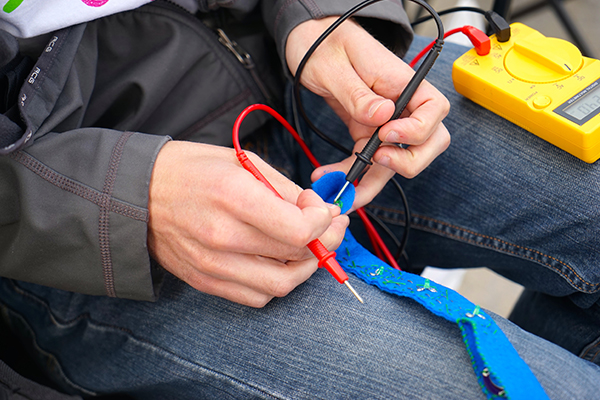E-STITCH Project Honored by National Science Foundation

E-STITCH adds materials such as conductive fibers, sensors, and LEDs to traditional fabric crafts.
Led by Colby Tofel-Grehl and other researchers in Instructional Technology and Learning Sciences and the School of Teacher Education and Leadership, the E-STITCH (Elementary STEM Teaching Integrating Technology and Computing Holistically) project was recently honored by the National Science Foundation for its innovation and engagement of young learners.
E-STITCH is an integrated curriculum for elementary teachers in grades 3-6 that emphasizes social studies, science, computing, mathematics, and literacy. Framed through an examination of U.S. history, E-STITCH explores historic and current issues of immigration, migration, and forced relocation.
Using children's literature and stories focused on human movement written by members of displaced or relocating groups, E-STITCH engages students in learning how to make programmable circuits that tell historic stories of human movement, such as that of enslaved people seeking to escape north to freedom on the Underground Railroad during the 1800s. These circuits help students visualize data through lights illuminating with varying brightness and other tactile methods, allowing students to better conceptualize and engage with concepts and stories.
“E-textiles and crafting circuits have been shown to improve both attitude and interest for youth in STEM, as well as improve learning outcomes of core science ideas,” said Dr. Tofel-Grehl. “This means that we can create lessons and activities where kids learn better and are more interested.”
E-STITCH’s fully-integrated curriculum is designed to enhance learning in social studies, science, computing, mathematics, and literacy through a deep dive into U.S. history topics like immigration, migration, and forced relocation. Dr. Tofel-Grehl said that the team is hoping to expand E-STITCH to help teachers use real-world data to engage students in complex historical and political topics like gerrymandering, gentrification, and redlining. “Our hope is to engage teachers and students in data-driven conversations about social and policy issues,” she said.
The E-STITCH project was honored by NSF program officers as one of only three projects nationwide that exemplifies efforts in engaging technology in classrooms for equitable education.
Dr. Colby Tofel-Grehl is the principal investigator for the project, which represents a collaboration between Drs. Andrea Hawkman (TEAL), Kristin Searle (ITLS), Mario Suarez (TEAL), and Beth MacDonald (TEAL). Each team member contributed expertise from their own content area and supported moving the professional learning online during the COVID-19 pandemic.
Tofel-Grehl is hopeful that this recognition from the National Science Foundation bodes well for the program’s future funding. Project E-STITCH currently has a $1.5 million scale up grant under review, which would allow it to further expand to support educators in innovative thinking about learning and curriculum.
Learn more about E-STITCH

